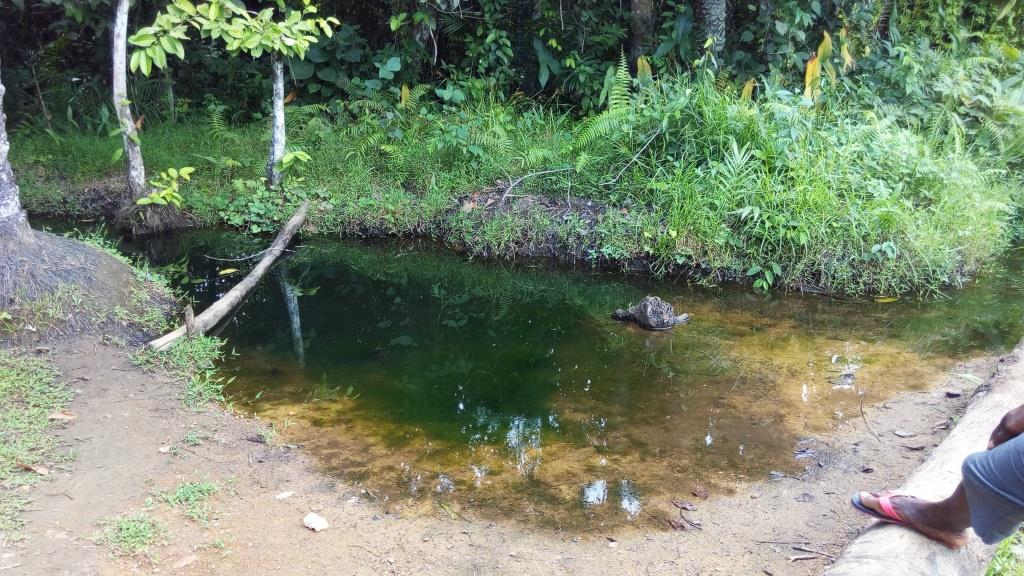-Rural Montserrado under the spotlight
By: George Y. Sharpe
“Water is life because we cannot go without it even for a day; this is why we come to this dirty swamp to get some water for cooking, washing and even drinking,” says Famata Carter, a resident of Zoe Town in Todee, some 40 miles outside Monrovia.
Since the end of the Liberian Civil war, Famatta recalls that the lack of safe drinking water has been a major challenge faced by her community.
Residing in Zoe Town since she was born back in the 1970’s, Famatta stresses in an interview with this Reporter, that lack of safe drinking water has been one situation that has remained constant in the area to date.
This is almost the same picture across rural Liberia.
Zoe Town is situated on about 15 kilometers from Montserrado County’s principal capital, Bensonville with Freeman Town next door facing the same predicament. There is a cluster of communities. The two towns have a population of over two hundred, with women and children in the majority.
Zoe Town pioneer, Famatta explains that during both the dry and rainy seasons, people living in this rural Montserrado town find it difficult to get water to drink and for other household uses.
“From the time I was a child – “normal day” – getting clean water to drink has been a problem for us here in Zoe and Freeman Towns. During the late 1970’s through the 1980’s, we were not plenty here, so people were not doing all types of things at the top of the stream. The number of cholera and diarrhea cases was not very high like these days,” Famata recounts.
She also spoke the lack of other basic social services they have been trying to cope with over the years and called on government and other development partners to intervene.
Another resident of this town, John Moses has a similar story to tell.
According to him, it has only been ‘the grace of God’ that has been keeping residents of the community alive over the years. He explained that sometimes during the raining season, the stream from which they get water can be “overly filthy,” as it brings along loads of wastes from its upper part.
Their best alternative is to drink rain water during this period.
“During the raining season some of us drink rainwater from our roofs because the water in the stream can be very dirty. And sometimes, some get diarrhea and are treated with the help of nurses at the clinic in Zingbor Town,” said John.
Access to safe drinking water is one of the basic human rights guaranteed under the Universal Declaration of Human Rights (UDHR), which Liberia was one of the original signatories after the second World War back in 1945.
Article 25 of the UDHR calls for a standard of living adequate for the health and wellbeing of all persons.
This right is also guaranteed by Article 8 of Liberia’s constitution which states: “The Republic shall direct its policy towards ensuring for all citizens, without discrimination, opportunities for employment and livelihood under just and humane conditions, and towards promoting safety, health and welfare facilities in employment.”
Towns Chief Moses Waye told this reporter that promises made by politicians to erect a hand pump are yet to be fulfilled.
“We tell every NGO that comes here that we need a hand pump to get safe drinking water but most of them are not involved with water and sanitation. They are mostly human rights NGOs. Politicians have been coming here to tell us that they will help us, but when they leave we don’t see them again,” the Chief stated.
Chief Waye described the situation as “dangerous” saying that his people have been catching cholera and diarrhea all year round as a result. He called on the government and partners to intervene for the sake of humanity.
But the local chief praised the media for following the situation in the area, urging them to spread the news about the suffering his people are going through.
Todee District Commissioner, Fatu Davis confirmed the serious water situation in Zoe and Freeman towns, describing it as pathetic and said it needs serious attention.
Madam Davis said her office has been working to find NGOs to help with the situation but it has not just been easy. Zoe and Freeman towns are not the only communities in the Todee area that are facing such a problem.
“Even the people living in Zalamu and Saybu village are up the hill and they do not have pump,” Commissioner Davis added.
The officer-in-charge of the local clinic in the area Victor Holder could not give statistics of people who come to the clinic with cases of cholera and diarrhea. But he confirmed that the records at the clinic show that a good number of cholera and diarrhea cases come from Zoe and Freeman towns and other surrounding villages.
Mr. Holder said since he took over the clinic in December 2016, he has found out that about five thousand people from eighteen different communities go there for treatment. Ccases of diarrhea and cholera come from communities where people drink from either creek or rain water from roof tops.
Commissioner Davis also volunteers her services at the clinic. She said cases of diarrheas are prevalent in these areas mostly during the dry season.
“Around this time of the year, most of them [patients] from Zoe Town, Freeman Town, Zalamu and other nearby villages come here with either cholera or diarrhea. We are fortunate that life has not been lost to these illnesses over the years, but it’s serious,” Commissioner Davis asserted.

